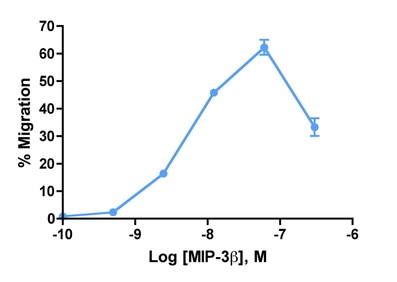Human CCL19 (MIP-3β)
|
Stock Sizes: 5ug, 20ug, 50ug, 100ug, and 1mg
Also available in custom sizes, email for a custom quote. |
BACKGROUND
Macrophage inflammatory protein-3-beta (MIP-3β/CCL19), also known as EBI1 ligand chemokine (ELC), directs chemotaxis of dendritic cells, and certain B- and T- lymphocytes, but not monocytes or granulocytes. It is constituitively expressed in thymus and lymph nodes and binds specifically to target cells expressing the receptor CCR7. Being a homeostatic chemokine, its primary physiological role is considered to be in the normal recirculation and homing of lymphocyte. However, MIP-3β could also be proinflammatory, and is implicated in the post-HIV infection responses.
Macrophage inflammatory protein-3-beta (MIP-3β/CCL19), also known as EBI1 ligand chemokine (ELC), directs chemotaxis of dendritic cells, and certain B- and T- lymphocytes, but not monocytes or granulocytes. It is constituitively expressed in thymus and lymph nodes and binds specifically to target cells expressing the receptor CCR7. Being a homeostatic chemokine, its primary physiological role is considered to be in the normal recirculation and homing of lymphocyte. However, MIP-3β could also be proinflammatory, and is implicated in the post-HIV infection responses.
|
SPECIFICATIONS
Source: E. coli derived Accession # P99731 (22-98) Modification: None Formulation: Lyophilized Carrier Protein: None Predicted Molecular Mass: 8.800 kDa Extinction Coefficient: 8,730 M-1 cm-1 Actual Molecular Mass: 8.800 kDa by ESI Mass Spec Protein Sequence: GTNDAEDCCLSVTQKPIPGYIVRNFHYLLIKDGCRVPAVVFTTLRGRQLCAPPDQPWVERIIQRLQRTSAKMKRRSS Endotoxin Level: <0.01 EU per 1μg of the protein by the LAL method Purity: > 97% by SDS PAGE PREPARATION AND STORAGE
Reconstitution: Spin sample prior to reconstitution. Recommended at 100μg/mL in sterile water Shipping: Room Temp Stability and Storage: Avoid repeated freeze-thaw cycles • 12 months from date of receipt, -20 to -70 °C as supplied. • 1 month, 2 to 8 °C under sterile conditions after reconstitution. • 3 months, -20 to -70 °C under sterile conditions after reconstitution. |
Migration Assay: Cells expressing recombinant CCR7 were assayed for migration through a transwell filter at various concentrations of MIP-3β. Responses are expressed as the % of total input cells.
Migration Assay Protocol Activity: EC50 = 7.2nM determined by migration assay with cells expressing recombinant CCR7
|
For bulk orders or custom sizes, please contact us and we can provide this for you.
|
|
|
|
|
|
REFERENCES
1. “Molecular Cloning of a Novel Human CC Chemokine EBI1-ligand Chemokine That Is a Specific Functional Ligand for EBI1, CCR7” Yoshida R., Imai T., Hieshima K., Kusuda J., Baba M., Kitaura M., Nishimura M., Kakizaki M., Nomiyama H., Yoshie O.J Biol Chem 272:13803-13809 (1997)
2. "CK beta-11/macrophage inflammatory protein-3 beta/EBI1-ligand chemokine is an efficacious chemoattractant for T and B cells."Kim C.H., Pelus L.M., White J.R., Applebaum E., Johanson K., Broxmeyer H.E. J. Immunol. 160:2418-2424(1998)
3. “Homeostatic chemokines CCL19 and CCL21 promote inflammation in human immunodeficiency virus-infected patients with ongoing viral replication.” Damås J.K., Landrø L., Fevang B., Heggelund L., Tjønnfjord G.E., Fløisand Y., Halvorsen B., Frøland S.S., Aukrust P. Clin Exp Immunol. 157:400-7 (2009)
1. “Molecular Cloning of a Novel Human CC Chemokine EBI1-ligand Chemokine That Is a Specific Functional Ligand for EBI1, CCR7” Yoshida R., Imai T., Hieshima K., Kusuda J., Baba M., Kitaura M., Nishimura M., Kakizaki M., Nomiyama H., Yoshie O.J Biol Chem 272:13803-13809 (1997)
2. "CK beta-11/macrophage inflammatory protein-3 beta/EBI1-ligand chemokine is an efficacious chemoattractant for T and B cells."Kim C.H., Pelus L.M., White J.R., Applebaum E., Johanson K., Broxmeyer H.E. J. Immunol. 160:2418-2424(1998)
3. “Homeostatic chemokines CCL19 and CCL21 promote inflammation in human immunodeficiency virus-infected patients with ongoing viral replication.” Damås J.K., Landrø L., Fevang B., Heggelund L., Tjønnfjord G.E., Fløisand Y., Halvorsen B., Frøland S.S., Aukrust P. Clin Exp Immunol. 157:400-7 (2009)




